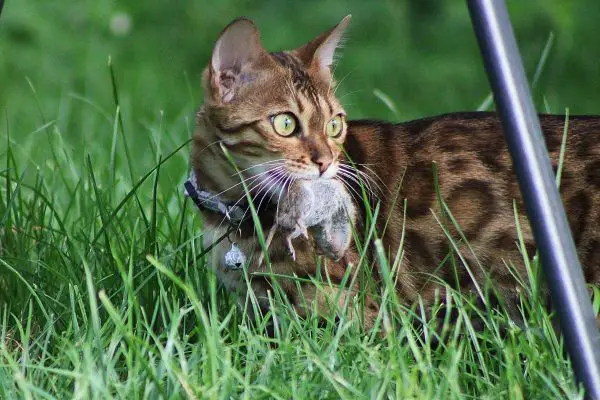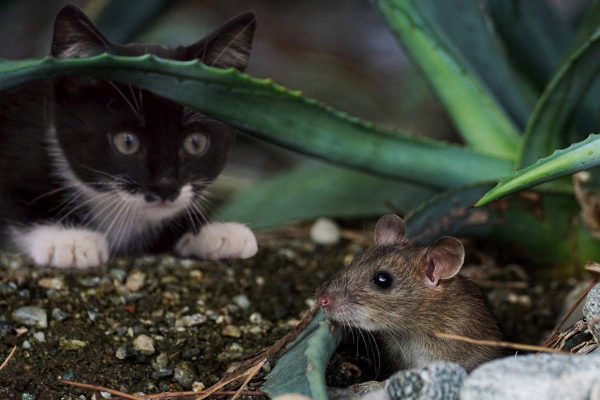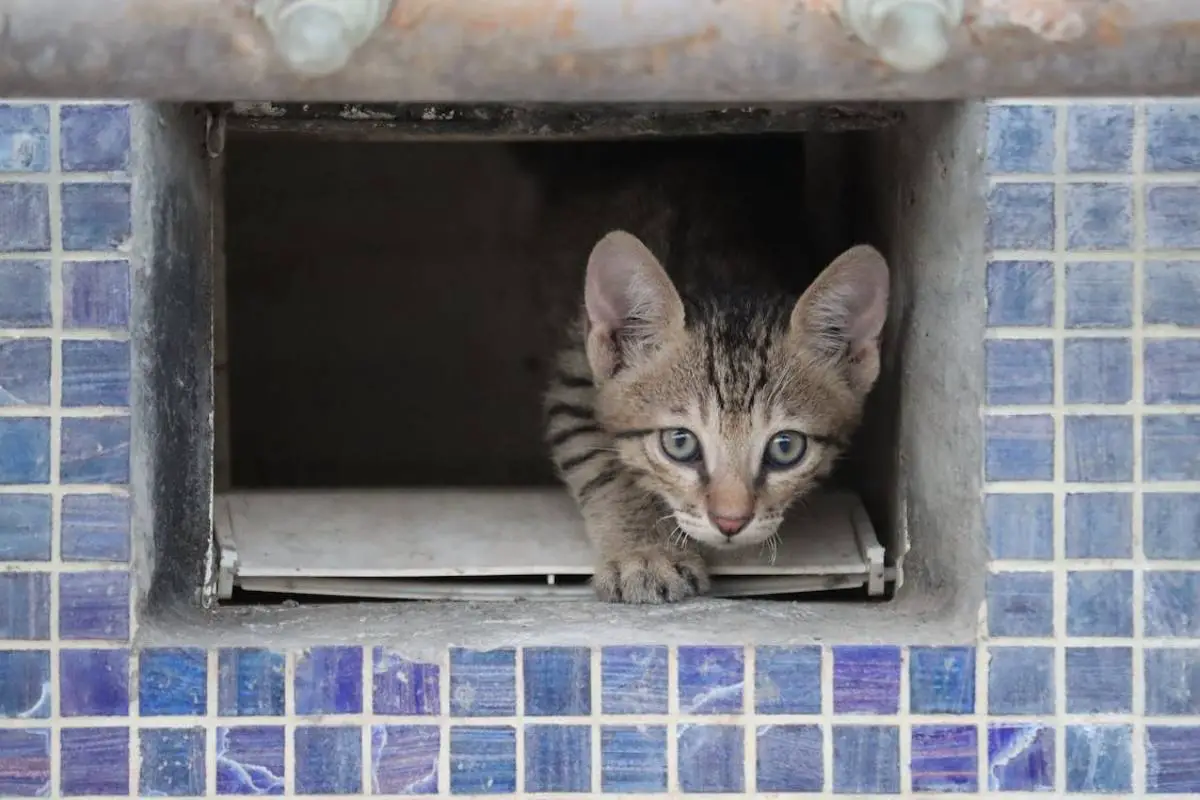The idea of putting your cat in the attic to catch mice may seem like a logical solution to pest control, given that cats have been our carnivorous companions for around 10,000 years. While this seems on the surface to be a good idea, there are a great many factors to consider before you decide to use your own feline friend as an exterminator.
So, should you put your cat in the attic to kill mice? The best answer to this question, in the interest of safety for both you and your companion, is no. If you feel you must, however, there are factors you can take into consideration to ensure as much safety as you can for your cat and anyone else in your home.
In this article we will discuss what drives your cat’s hunting behavior and the safety concerns for you and your cat that accompany any hunting you allow them to do. We will also delve a little bit into why cats like to hunt, and what affect your cat’s breed and lifestyle should have on your decision to let them hunt.
Hunting Behavior

Cats are natural-born hunters, with sharp instincts they inherited from their common wild ancestor, the Near Eastern wildcat. It has long been thought that the relationship between cats and humans began as a symbiotic one, wherein cats provided pest control to early agrarian cultures in exchange for food and shelter.
Because of their reputation as skilled predators, specifically when it comes to pests and rodents, many humans today use or consider using their domestic cats to control those populations.
There is nothing inherently wrong with this hunting behavior, and the fact that your cat has a strong prey drive is nothing to worry about in itself. Many people have domestic cats who roam outdoors during the day to come in at night and are often surprised with “gifts” from their companions.
While these offerings seem odd and off-putting to us, it is actually our feline friends’ way of trying to care for us based on their instincts, and their perception of our complete lack of them.
While your cat’s prey drive is completely normal, these behaviors can result in a lot of complications for them if they are not carefully observed and controlled. Just because it is in a cat’s nature to hunt does not mean it is safe or ideal, especially for our domesticated companions.
Disease/Parasites
The strongest driving reason behind not utilizing your cat as pest control is health and safety. Despite hunting instincts coming naturally to cats, there are countless dangers associated with these behaviors based on both the prey and the environment, which we will discuss later.
Rodents and pests carry numerous parasites, viruses, bacteria, and diseases that pass easily to cats and sometimes even to humans. Below are just a few examples of some of the most common infections rodents are known to carry, most of which pass quite easily to cats through contact or ingestion:
- Toxoplasmosis – A parasitic disease that can be passed to humans, which is particularly dangerous for pregnant women
- Intestinal parasites – Can include roundworms which are transmissible to humans
- Plague – A bacterial infection that comes from the same bacteria as the notorious “black plague”
- Leptospirosis – A bacterial infection that is highly transmissible to humans and sometimes leads to liver disease
- Hantavirus – Cats can be infected by this virus but show no symptoms and cannot transmit to humans; however, if you are brought a “gift” that is infected with hantavirus, it can be transmitted to you that way
This is a short list that is not comprehensive but does represent some of those most common and potentially dangerous infections that could affect you, your cat, and anyone else in the home. In addition to the infectious threats that hunting poses to your home and your feline friends, there is also the threat of the prey itself.
Rodents are more adept at defending themselves against cats than we give them credit for. Rodents are known for their large front teeth and clawed feet, capable of inflicting serious bites and deep scratches which can become infected.
If you must use your cat for pest control, it is imperative to understand what kind of pest you expect them to hunt. The difference between a field mouse and a rat, or even larger pests like possums and racoons, can potentially be lethal for your feline family member.
When considering if the pros of using your cat to kill pests outweigh the cons, you must think about not only the hazards posed by their prey, but those posed by the environment as well.
Environmental Hazards

Potential threats from the prey aside, there are environmental hazards to think about when deciding whether to use your feline friend as an exterminator. Cats are great at regulating their own body temperature, but attics can reach extreme temperatures in heat and cold quite easily, and it may not register quickly enough with your cat that it needs to leave.
This could lead to heat stroke during warmer months or hypothermia in the winter, both of which can be fatal for your family member. Once again, if you feel you must use your cat to hunt mice, leave the attic door and a window, if there is one, open and make sure your companion has access to plenty of clean water.
In addition to temperature fluctuation, consider the structural integrity and design of the room you wish to use for a rodent “thunderdome.” Unfinished attics are typically not well-ventilated or well-lit, and often consist of series of exposed beams and sometimes even insulation and other building materials that could be hazardous to your cat.
Moreover, if you have a mouse problem, you likely have tried other methods of ridding your home of these unwelcome guests. If you have laid out traps or rodenticide, they pose yet another environmental threat that could cause as much harm to your cat as they do to their intended victims.
Even the common “indoor/outdoor” cat faces countless hazards during forays outside to hunt, meaning there is no true ideal way to let your cat exercise these instincts. Lot of play and mental stimulation go a long way in helping your cat feel like a fearless hunter, even if its prey is a fluffy pink toy. Should I let my cat catch mice? It’s essential to weigh the risks and take necessary precautions for your cat’s safety.
Breed and Lifestyle
Your cat’s skill and desire for hunting likely depends on its breed and lifestyle. Active breeds like the Bengal or the hybrid Savannah cat have a remarkably high prey drive, while their calmer cousins such as the Persian or Himalayan tend to prefer lounging to hunting.
A more active cat may have a higher drive to hunt, but it does not mitigate any of the dangers we have already discussed. Meanwhile, if you put one of these lazy breeds in your attic for pest control, they might end up finding a nice spot for a nap while the mice play, defeating your purpose anyway.
In addition to breed, the lifestyle to which your cat has already adjusted will influence their desire and ability to hunt as well. If your cat has lived its whole life indoors without exposure to live prey, attempting to use it to kill mice may result in serious injury to your inexperienced companion.
Prevention and Understanding
If you have read this far and are still considering using your cat to kill mice, make sure you are taking every precaution to ensure the safety of both you and your companion.
Give your cat routine flea, tick, and heartworm prevention medication, bathe it frequently, and take it to a veterinarian on a highly regular basis to check for diseases, viruses, and parasites that it could be picking up from its prey. Finally, it is important to understand that your domestic feline hunts not for sustenance, but out of instinctual drive and even enjoyment.
Domestic cats often play with their prey instead of killing it for that very reason. So, if you do use your cat to hunt mice, do not assume you no longer need to feed it as much, as it likely will not be eating many of its kills. Despite the indifferent reputation domestic cats tend to have, they love and rely on their human family members and need us to care for them.
Conclusion
Putting your cat in the attic to kill mice is not advisable, but if you feel you must, ensure you fully understand your cat’s natural instincts and how they are affected by breed and lifestyle.
Make sure you have observed and understand the nature of the prey you want your cat to hunt, the dangers that prey may pose, as well as all the environmental factors that could affect your cat while it hunts.
And finally, if you do let your cat hunt rodents, make certain you take every precaution for the health and safety of yourself and your loyal companion. Cats may seem aloof and independent, but they need their families as much as we need them.

